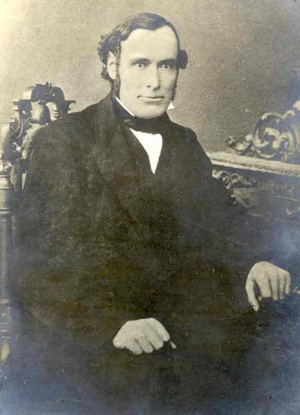Difference between revisions of "Ewert, Wilhelm (1829-1887)"
| [unchecked revision] | [checked revision] |
GameoAdmin (talk | contribs) (CSV import - 20130820) |
GameoAdmin (talk | contribs) (CSV import - 20130823) |
||
| Line 3: | Line 3: | ||
Scan provided by | Scan provided by | ||
| − | [http://mla.bethelks.edu/archives/numbered-photos/pholist2.php | + | [http://mla.bethelks.edu/archives/numbered-photos/pholist2.php Mennonite Library and |
| − | Archives MLA Photo 2003-0140 | + | Archives MLA Photo 2003-0140]'']] Wilhelm Ewert, a Mennonite elder and leader, born 23 February 1829 at Stronske, [[Thorn (Kuyavian-Pomeranian Voivodeship, Poland)|Thorn]], [[Prussia|Prussia]], died 21 June 1887 near Hillsboro, [[Kansas (USA)|Kansas]], was the youngest son of Peter and Maria Ewert. He attended a secondary school in Thorn, and learned carpentry. On 30 May 1854 he married Anna Janz, a daughter of Cornelius and Sarah Janz. Of the 13 children, only six outlived their father. |
| − | |||
| − | '']] Wilhelm Ewert, a Mennonite elder and leader, born 23 February 1829 at Stronske, [[Thorn (Kuyavian-Pomeranian Voivodeship, Poland)|Thorn]], [[Prussia|Prussia]], died 21 June 1887 near Hillsboro, [[Kansas (USA)|Kansas]], was the youngest son of Peter and Maria Ewert. He attended a secondary school in Thorn, and learned carpentry. On 30 May 1854 he married Anna Janz, a daughter of Cornelius and Sarah Janz. Of the 13 children, only six outlived their father. | ||
In 1843 Ewert was baptized by Elder David Adrian of the [[Obernessau (Kuyavian-Pomeranian Voivodeship, Poland)|Obernessau Mennonite Church]], which elected him as minister in 1860 and as elder in 1868. When the West Prussian Mennonites were in danger of losing their principle of [[Nonresistance|nonresistance]] because of the compromise accepted by most of the West Prussians following the order of cabinet of 1867, he was active in finding a country which would honor their convictions. In 1870 he and Peter Dyck visited [[Russia|Russia]] to investigate settlement possibilities. When they saw that the Mennonites in Russia were confronted by the same problem, they directed their attention to America. Again Ewert was one of the delegates who investigated the prairie states and provinces. | In 1843 Ewert was baptized by Elder David Adrian of the [[Obernessau (Kuyavian-Pomeranian Voivodeship, Poland)|Obernessau Mennonite Church]], which elected him as minister in 1860 and as elder in 1868. When the West Prussian Mennonites were in danger of losing their principle of [[Nonresistance|nonresistance]] because of the compromise accepted by most of the West Prussians following the order of cabinet of 1867, he was active in finding a country which would honor their convictions. In 1870 he and Peter Dyck visited [[Russia|Russia]] to investigate settlement possibilities. When they saw that the Mennonites in Russia were confronted by the same problem, they directed their attention to America. Again Ewert was one of the delegates who investigated the prairie states and provinces. | ||
Revision as of 14:32, 23 August 2013

Wilhelm Ewert, a Mennonite elder and leader, born 23 February 1829 at Stronske, Thorn, Prussia, died 21 June 1887 near Hillsboro, Kansas, was the youngest son of Peter and Maria Ewert. He attended a secondary school in Thorn, and learned carpentry. On 30 May 1854 he married Anna Janz, a daughter of Cornelius and Sarah Janz. Of the 13 children, only six outlived their father.
In 1843 Ewert was baptized by Elder David Adrian of the Obernessau Mennonite Church, which elected him as minister in 1860 and as elder in 1868. When the West Prussian Mennonites were in danger of losing their principle of nonresistance because of the compromise accepted by most of the West Prussians following the order of cabinet of 1867, he was active in finding a country which would honor their convictions. In 1870 he and Peter Dyck visited Russia to investigate settlement possibilities. When they saw that the Mennonites in Russia were confronted by the same problem, they directed their attention to America. Again Ewert was one of the delegates who investigated the prairie states and provinces.
In the spring of 1874 Ewert and his family and a few families of his congregation settled in Marion County, Kansas, joining with a group of Mennonites from Russia to found the Brudertal Mennonite Church the same year. Ewert was the first elder. He at once became active in community and conference activities and was one of the great promoters of elementary and secondary education, and particularly of Bethel College. He was always generous in aiding needy individuals and groups financially and spiritually. He was succeeded as elder by his son William J. Ewert. Another son, H. H. Ewert, was the well-known teacher of Halstead Seminary and Gretna Collegiate Institute.
Bibliography
Ewert Collection, Mennonite Library and Archives, North Newton, Kansas.
Goerz, David. "Wilhelm Ewert." Christlicher Bundesbote (15 July 1887).
| Author(s) | Cornelius Krahn |
|---|---|
| Date Published | 1956 |
Cite This Article
MLA style
Krahn, Cornelius. "Ewert, Wilhelm (1829-1887)." Global Anabaptist Mennonite Encyclopedia Online. 1956. Web. 12 Feb 2026. https://gameo.org/index.php?title=Ewert,_Wilhelm_(1829-1887)&oldid=94569.
APA style
Krahn, Cornelius. (1956). Ewert, Wilhelm (1829-1887). Global Anabaptist Mennonite Encyclopedia Online. Retrieved 12 February 2026, from https://gameo.org/index.php?title=Ewert,_Wilhelm_(1829-1887)&oldid=94569.
Adapted by permission of Herald Press, Harrisonburg, Virginia, from Mennonite Encyclopedia, Vol. 2, p. 276. All rights reserved.
©1996-2026 by the Global Anabaptist Mennonite Encyclopedia Online. All rights reserved.
